
Introduction
The year 2021 has just elapsed and Egypt remains far from achieving democracy. As the country is stumbling over its path, the year 2021 has witnessed nothing but further repression and closure of the public sphere. Justice continued to follow a route that has a total disregard for the law or the constitution. At the outset of 2021, Egypt’s president issued a decision to extend the nationwide state of emergency, and summoned a number of writers, journalists and those holding opposing viewpoints from inside their jail, after exceeding the maximum legal limit for pretrial detention period, to interrogate them over new cases. The position of the State Security Prosecution didn’t change as well; as it didn’t only acknowledge the seriousness of the charges pressed against the accused but also issued new decisions to detain writers, journalists and opinion holders.
It could be argued that 2021 is the year of contradictions and disparities between formal statements and the actual situation that surrounds human rights in Egypt.
While the year started with a republican decision to extend the state of emergency and its notorious law, it ended with lifting it and abolishing its provisions, and as 2021 marked the launch of the so-called the National Human Rights Strategy, it ended with thousands of citizens being held in prolonged pretrial detention for the mere expression of their opinions. The crackdown and security attacks targeting some academics concerned with public affairs have sadly become commonplace now. The year also began with promoted allegations of a democratic breakthrough and the opening of the public sphere, while it concluded with the establishment of the largest number of prisons and the amendments to major legislation that is consistent with the rights and guarantees of detainees and their defense lawyers making it more stringent, wasteful and careless to these rights. The year ended up, in late December, with harsh judicial rulings issued against a number of bloggers and activists in exceptional trials that undermine the defendants’ rights to due process and their lawyers’ right to obtain a copy of the indictment papers. These trials concluded with black scenes where a simple court worker pronounced the verdict while the trial judge was hidding behind the walls of his dark room.
Summary
Protests didn’t stop during the year, which witnessed 211 protest events organized by various political powers. The social and labor protests topped the list of protests with 151 events, while the activities of the Muslim Brotherhood’s supporters continued to decline with only 30 protests recorded during the reporting period. On the other hand, the year saw 19 protest events staged by students, 5 protests by the civil power, and 6 protests supporting the authorities and the decisions made by the current regime.
Military trials continued during 2021; as the year saw the deliberation of 69 trials three of which are considered before military tribunals against 432 civilians. 143 various sentences were handed down by the Egyptian judiciary in 2021 over cases related to public affairs; of these, there were 98 rulings of conviction, 43 acquittals, and two suspended sentences issued by the criminal courts.
Death sentences are still handed down by the civil judiciary; with 18 rulings in political cases against 103 defendants, including 42 received final and binding/ non-appealable verdicts, in addition to 103 rulings in criminal cases against 193 defendants, including 4 with final and binding judgments. The Prison Authority sector has also implemented the death sentences handed down against 44 defendants in 17 cases.
The year 2021 also witnessed a continuation of the violations against media freedoms, with 154 various cases of violation being recorded, most particularly in investigations, detention renewal sessions, and trials, which recorded 70 violations.
This is the “eighth” annual report released by Lawyers for Democracy Initiative to monitor the state of Egypt’s democratic path during 2021 in details, numbers, percentages and figures illustrating the measures and events affecting the democratic path during the year.
“Lawyers for Democracy” Initiative:
“Lawyers for Democracy” is an initiative launched by the Arabic Network for Human Rights Information (ANHRI) in 2014. It consists of a group of lawyers in a number of Egypt’s different governorates and cities to monitor the events, cases, and incidents that took place in the country; such as protests, conferences, strikes and official and non-official practices that affect Egypt’s democratic path. Lawyers of the initiative monitor and document these incidents and provide legal support if needed, and then they release reports to elucidate Egypt’s situation (from the partisan public sphere to the media and judicial field) when it comes to the rule of law, respect for freedom of expression and the democratic path.
^^^^^^^^^^^^^^^^^^^^^
Chapter 1
Protest events
The year 2021 has witnessed the various political powers organizing 211 different protest events, in spite of the measures taken by the authorities to face such protests and their constant and escalating efforts to thwart them, either by using the Protest Law issued under former President Adly Mansour’s rule, or by using other security measures.
Protests staged by political powers, particularly the National Alliance to Support Legitimacy (NASL) and the Muslim Brotherhood (MB), have declined, on the other hand, as a result of the security attacks they are subjected to.
The details of the 211 protest events that took place during the year and their distribution according to the different powers and months are as follows:
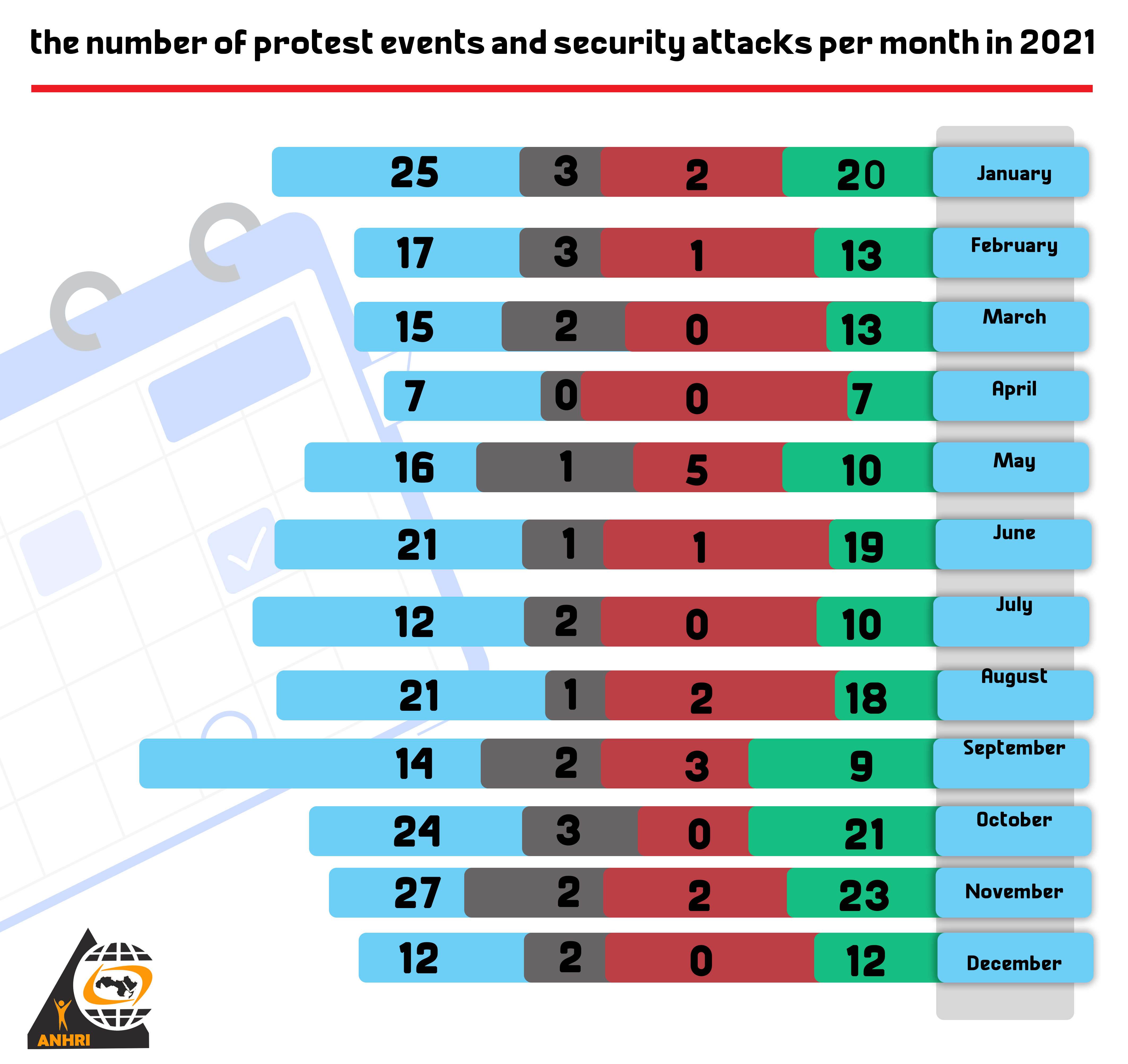 The following table shows the number of protest activities and the security attacks they were subjected to during 2021:
The following table shows the number of protest activities and the security attacks they were subjected to during 2021:
|
Months |
Protests that faced security attacks |
Protests that didn’t face security attacks |
Protests subject to negotiations |
Total in 2021
|
|
January |
2 |
20 |
3 |
25 |
|
February |
1 |
13 |
3 |
17 |
|
March |
— |
13 |
2 |
15 |
|
April |
— |
7 |
— |
7 |
|
May |
5 |
10 |
1 |
16 |
|
June |
1 |
19 |
1 |
21 |
|
July |
— |
10 |
2 |
12 |
|
August |
2 |
18 |
1 |
21 |
|
September |
3 |
9 |
2 |
14 |
|
October |
— |
21 |
3 |
24 |
|
November |
2 |
23 |
2 |
27 |
|
December |
— |
12 |
— |
12 |
|
Total in 2021 |
16 |
175 |
20 |
211 |
A comparison between the numbers of protests from 2014 to 2021:
The following graph clarifies the comparison between the numbers of protest events during the seven years
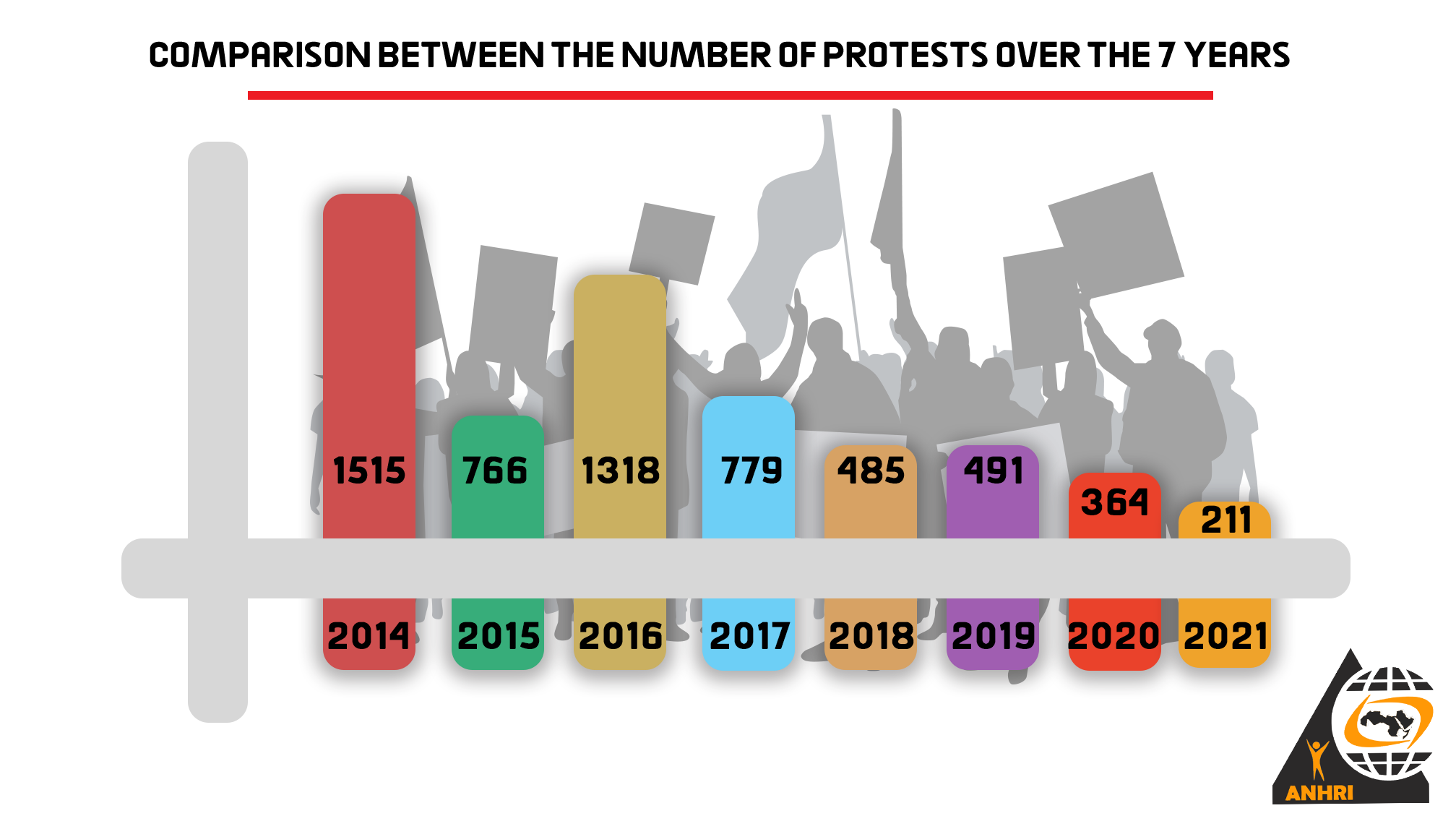
Pro and anti-regime protests
Thanks to the mass rallies that took place in conjunction with the holding of the parliamentary elections and the commemorations of the 6th of October War, the pro-regime activities have continued, with 6 protest events being organized during the year, compared to 2021 which witnessed 11 events.
As usual, the Protest Law hasn’t been implemented or applied on the pro-government protest events; as none of them was banned or attacked during the year as it always happens with the anti-government protests.
While there were 205 events of opposition, the year only witnessed 6 pro-regime events as shown in the following table:
|
Pro- regime events |
Anti-regime events |
|
6 |
205 |
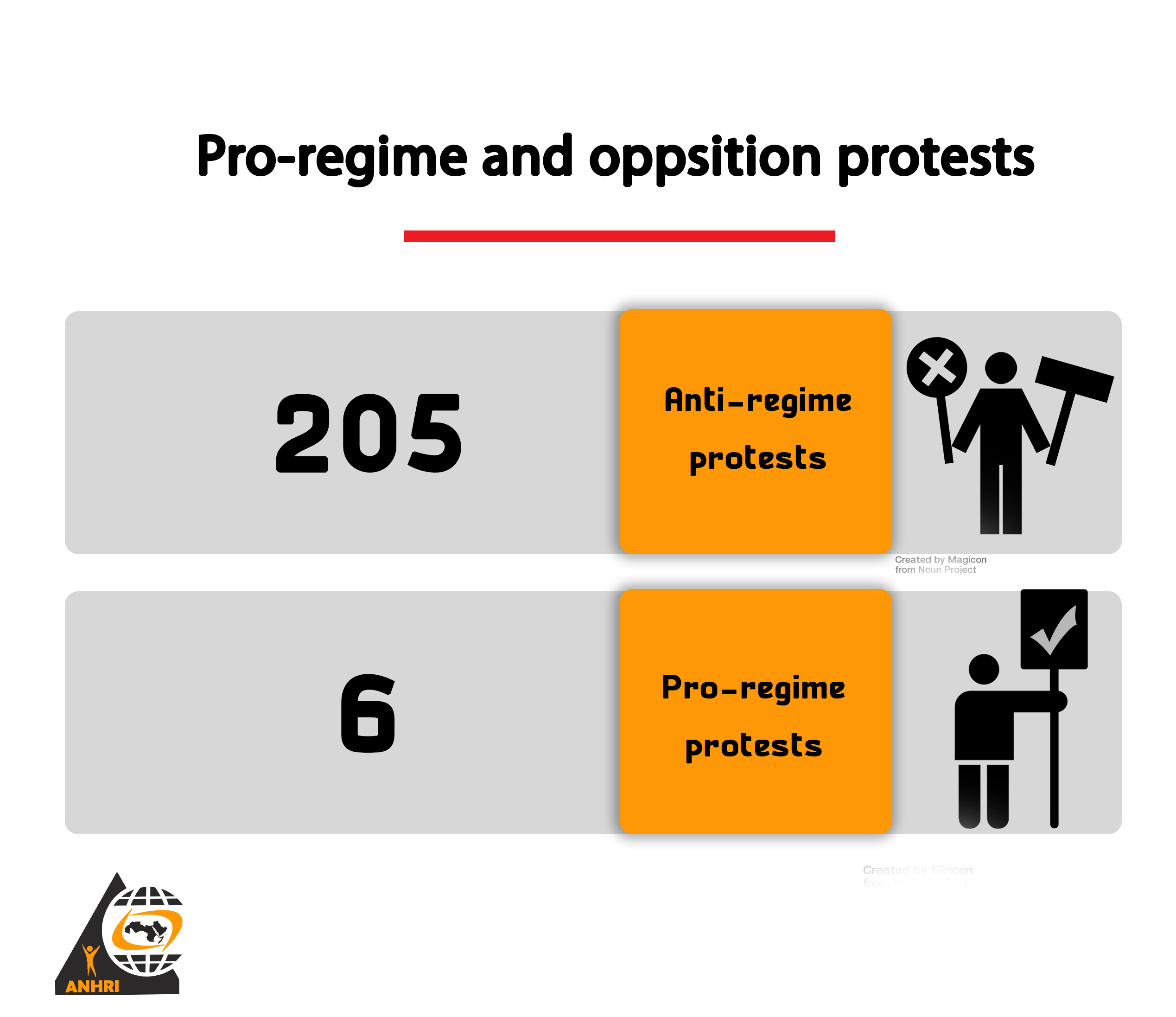
Security attacks on protest events:
During 2020, 211 different protest events were organized, out of which 16 protests were attacked by the security forces, while 175 went on without attacks, and 20 were resolved by the authorities following negotiations with the protests’ organizers.
The following table shows the number of protest events that faced security attacks:
-
Total number of events
Events didn’t face security attacks
Events faced security attacks
Events negotiated
211
175
16
20
The following graph shows the percentage of the security intervention in the protest events:
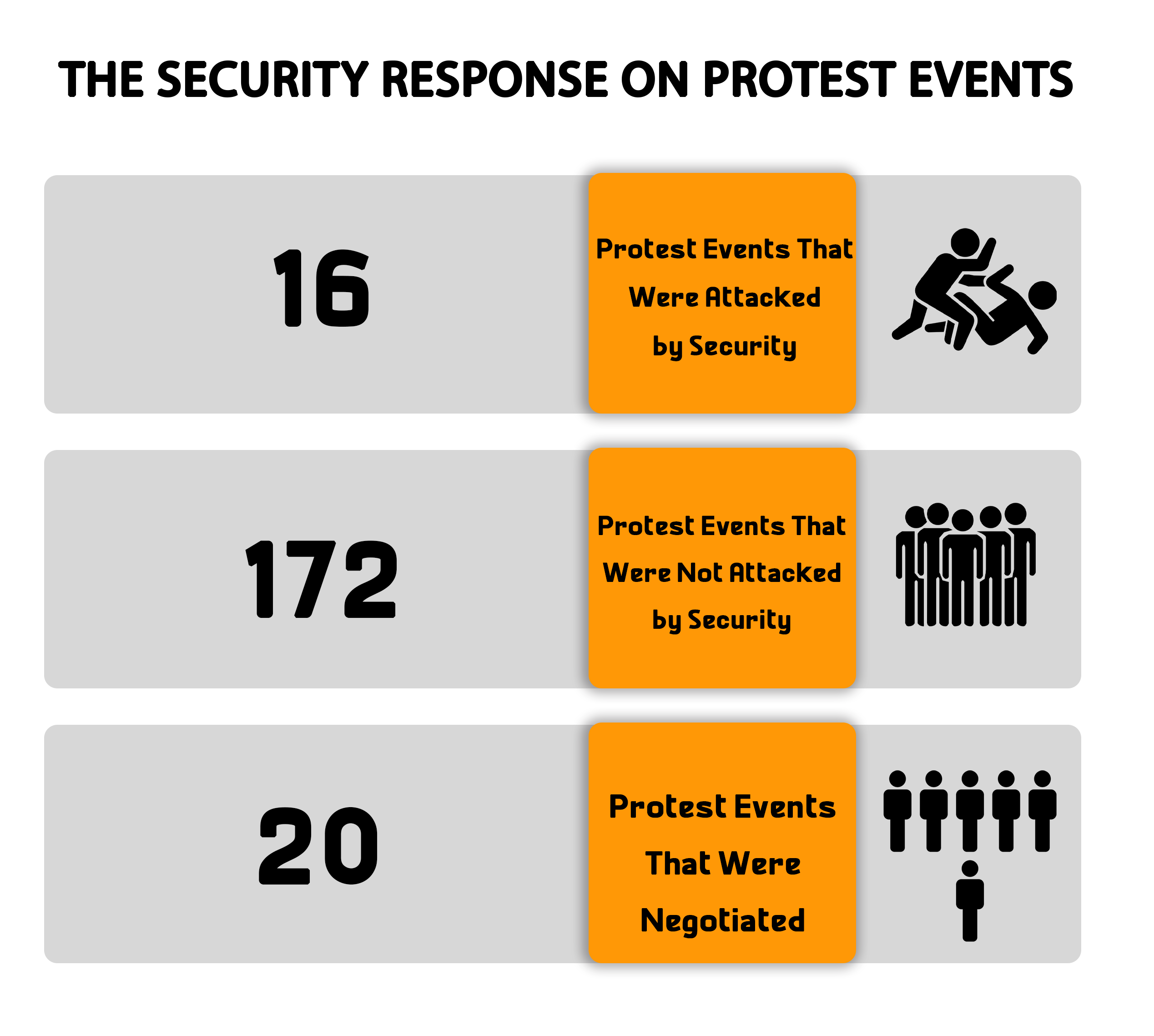
Protest events according to the powers organizing them:
Labor and Social Protests were at the forefront of the protest scene with 151 protests, followed by the protests organized by the Muslim Brotherhood (MB) and the National Alliance to Support Legitimacy (NASL) which was amounted at 30 events, while the students’ protests have ranked third with 19 protest events being organized.
The following graph shows the number of protests according to the forces that organize those events:
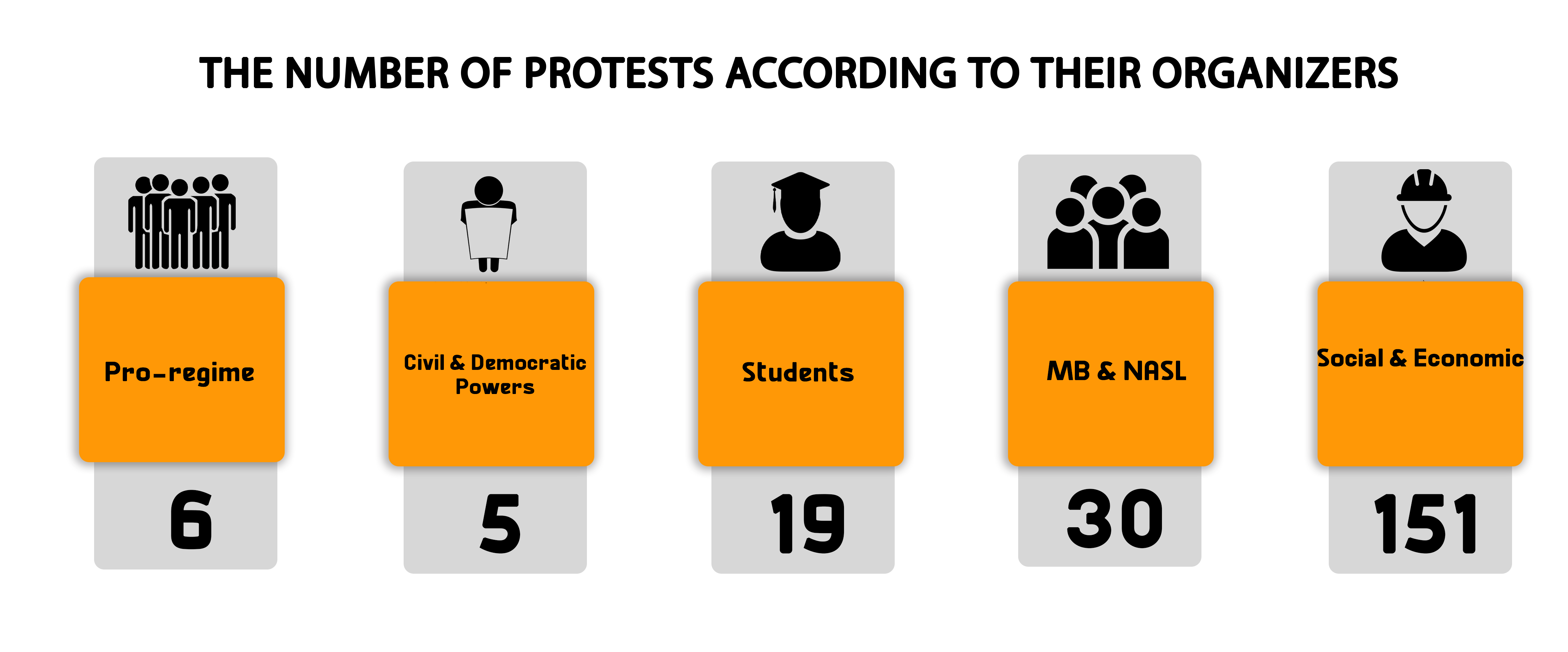
First: (MB) & (NASL) protest events:
During 2021, the protests organized by Muslim Brotherhood (MB) group and its ally, the National Alliance to Support Legitimacy (NASL), have continued to decline as a result of the security forces’ targeting of the group and the prosecution of its members. Both MB and NASL jointly staged only 30 protest events throughout the year, all of which are characterized by low participation/response rate and duration.
|
Months |
Protests that faced security attacks |
Protests that didn’t face security attacks |
Protests negotiated |
Total |
|
January |
— |
7 |
— |
7 |
|
February |
— |
— |
— |
— |
|
March |
— |
— |
— |
— |
|
April |
— |
— |
— |
— |
|
May |
2 |
2 |
— |
4 |
|
June |
— |
6 |
— |
6 |
|
July |
— |
— |
— |
— |
|
August |
2 |
6 |
— |
8 |
|
September |
— |
— |
— |
— |
|
October |
— |
5 |
— |
5 |
|
November |
— |
— |
— |
— |
|
December |
— |
— |
— |
— |
|
Total during 2020 |
4 |
26 |
— |
30 |
The security forces continued to target the MB &NASL’s demonstrations with 5 different protest events being attacked throughout 2021.
The following table shows the attack on MB and NASL’s protests in numbers:
-
Protests that didn’t face security attacks
Protests faced security attacks
Protests negotiated
Total
26
4
—
30
The following graph clarifies the percentage of the attack on MB and NASL’s protests
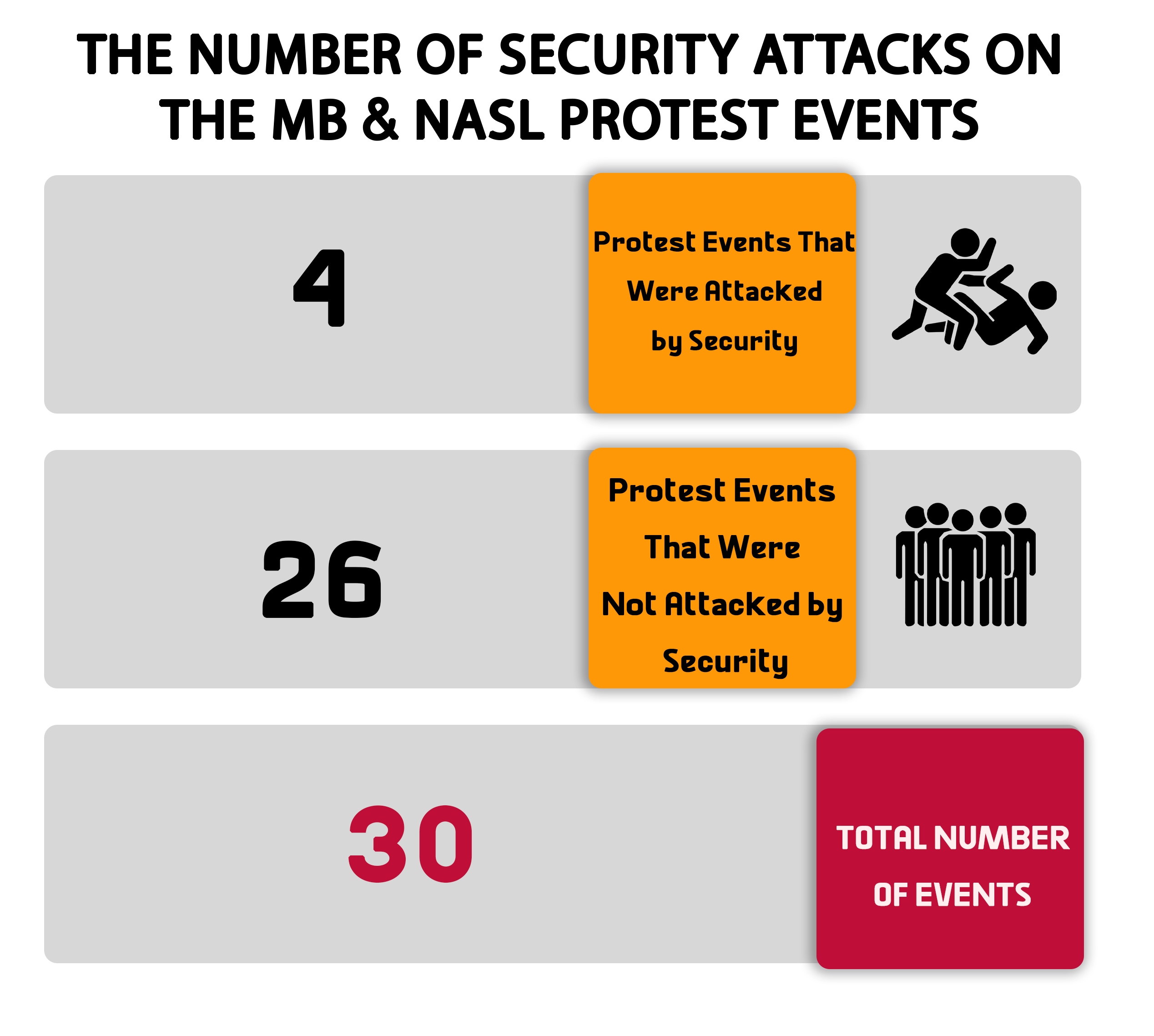
The most important demands brought by the Muslim Brotherhood (MB) and the National Alliance to Support Legitimacy (NASL) during 2021:
-
Demanding the release of the elderly leaders of the Muslim Brotherhood following the rulings of conviction handed down against the group’s deputy supreme guide Mahmoud Ezzat
-
Commemorating the dispersal of Raba’a al-Adawiya and al-Nahda sit-ins
Second: Civil and democratic powers protest events
The year 2020 witnessed a continuous decline in the numbers of protest activities organized by the democratic civil powers; and this was due to the ongoing detention of a number of civil and democratic powers’ figures who managed to organize only five protests during the entire year, three of them passed without security intervention, while the other one left was subjected to security attacks.
The following table shows the number of social and labor protests in 2021 per month:
|
Months |
Protests that faced security attacks |
Protests didn’t face security attacks |
Protests negotiated |
Total |
|
January |
— |
— |
— |
— |
|
February |
1 |
— |
— |
1 |
|
March |
— |
— |
— |
— |
|
April |
— |
— |
— |
— |
|
May |
— |
3 |
— |
3 |
|
June |
1 |
— |
— |
1 |
|
July |
— |
— |
— |
— |
|
August |
— |
— |
— |
— |
|
September |
— |
— |
— |
— |
|
October |
— |
— |
— |
— |
|
November |
— |
— |
— |
— |
|
December |
— |
— |
— |
— |
|
Total in 2021 |
2 |
3 |
— |
5 |
Attacks on the civil and democratic forces’ protest events:
The current year witnessed five protest events organized by the civil and democratic forces, three of these protests passed without interference from the security forces, while the two other events were subjected to security attacks during which two of its participants were arrested.
The most prominent activities by the civil and democratic powers during 2021:
-
Political activist Mohamed Adel went on hunger strike in objection to the physical assault he was subjected to at the hands of the head of the North Mansoura Public Prosecution during the activist’s detention renewal session.
-
Activist Ahmed Samir went on hunger strike in his jail in protest of the prison sentence issued against him by the Fifth Settlement Emergency State Security Misdemeanor Court.
-
Protests to show solidarity with the Palestinian people and the Sheikh Jarrah neighborhood’s people.
The following table illustrates the number of attacks on labor and social protests:
-
Protests that didn’t face security attacks
Protests that faced security attacks
Total
3
2
5
The following graph illustrates the percentage of attacks on the civil and democratic powers’ protests:
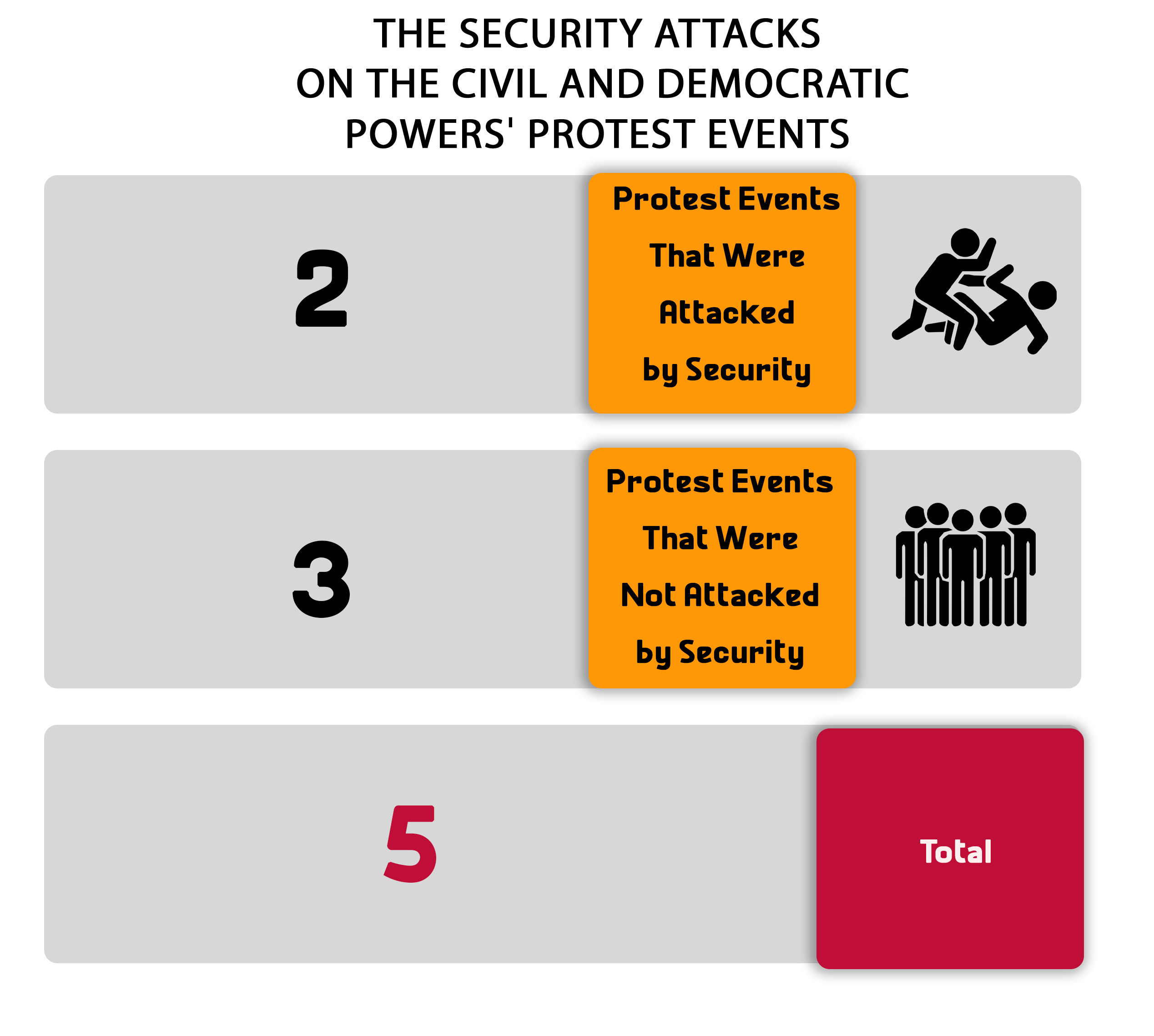
Third: Social and labor protests
Labor protests continued in 2021 owing to the poor economic and living conditions, as the number of protest events organized during the year reached 151, most of which sought to improve the conditions of workers and community services.
The following table shows the number of social and labor protests and their distribution in 2020:
|
Months |
Protests that faced security attacks |
Protests didn’t face security attacks |
Protests negotiated |
Total |
|
January |
2 |
10 |
3 |
15 |
|
February |
1 |
10 |
3 |
14 |
|
March |
— |
12 |
2 |
14 |
|
April |
— |
7 |
— |
7 |
|
May |
— |
7 |
1 |
8 |
|
June |
1 |
8 |
1 |
10 |
|
July |
— |
10 |
2 |
12 |
|
August |
— |
9 |
1 |
10 |
|
September |
3 |
9 |
2 |
14 |
|
October |
— |
9 |
3 |
12 |
|
November |
2 |
20 |
2 |
24 |
|
December |
— |
11 |
— |
11 |
|
Total in 2020 |
9 |
122 |
20 |
151 |
Attacks on social protests:
During 2021, the security forces intervened to forcibly disperse 9 protests organized by the labor and social powers and succeeded to resolve 20 events through negotiation, while it left 122 events without interference.
The following table illustrates the number of attacks on labor and social protests:
-
Protests that didn’t face security attacks
Protests that faced security attacks
Protests resolved through negotiation
Total
122
9
20
151
The following graph illustrates the attacks on labor and social protests in percentage:
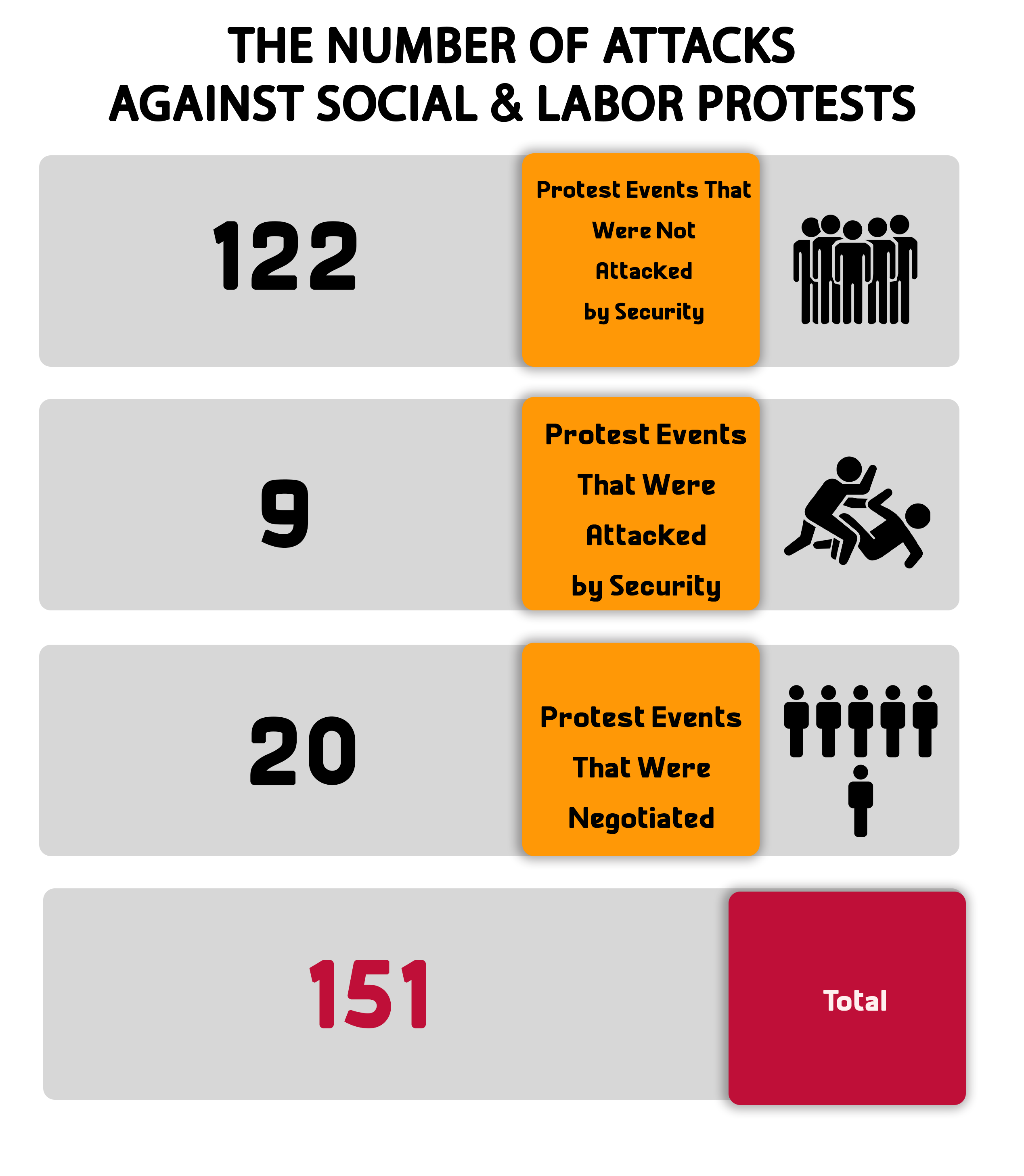
Social protests’ most important demands in 2021:
-
Demanding better wages and that the families of workers are added to the health system.
-
A number of lawyers staged a sit-in in Kafr El-Dawwar city (Behira governorate) to protest the mistreatment of a public prosecutor and his continued crackdown on them, calling to hold him accountable.
-
Protests by El Max in Alexandria, Ezbet Khair Allah in Cairo, and Bulaq El Dakrour in Giza.
-
Universal factory workers went on strike to demand better wages and the release of their arrested co-workers.
-
Protesting the lack of health services in the city of Manfalut, Assiut governorate.
-
Workers at the Iron and Steel Company protested against the decision to liquidate their company
-
Employees at Dar Al-Kotb publishing house protested the new financial regulation introduced by the Ministry of Culture
Fourth: Students’ protests
The year 2021 witnessed a continued decline in the number of protests organized by students as a result of the severe repressive measures taken by school and university administrations to ban the exercise of public affairs’ activities on campus. These measures have amounted to dismissal from the university/ school depriving students of completing their studies. During the year, students organized only 19 protest events, as follows:
The following table shows the number of student protests and their distribution during 2020
|
Months |
Protests that faced security attacks |
Protests didn’t face security attacks |
Protests negotiated |
Total |
|
January |
— |
— |
— |
— |
|
February |
— |
2 |
— |
2 |
|
March |
— |
1 |
— |
1 |
|
April |
— |
— |
— |
— |
|
May |
— |
1 |
— |
1 |
|
June |
— |
4 |
— |
4 |
|
July |
— |
— |
— |
— |
|
August |
— |
3 |
— |
1 |
|
September |
— |
— |
— |
— |
|
October |
— |
4 |
— |
4 |
|
November |
— |
3 |
— |
3 |
|
December |
— |
1 |
— |
1 |
|
Total in 2020 |
— |
19 |
— |
19 |
The following graph shows the number of attacks on students’ protest events
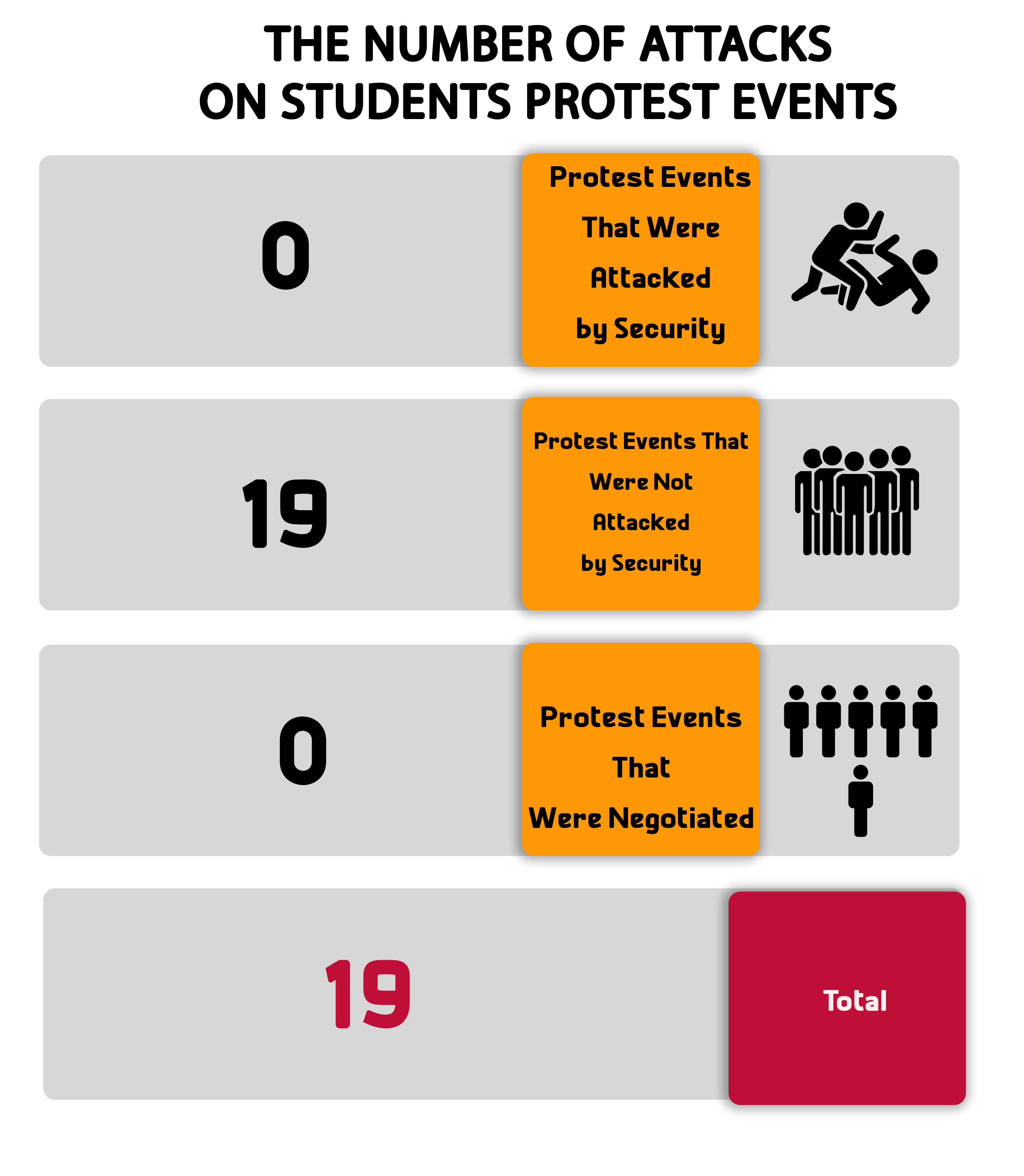
The most important demands by student protests:
-
Preparatory school students in Giza governorate objected to the difficulty of exams.
-
A number of Thanaweya Amma students objected to the lack of sufficient time in experimental exam.
-
A number of students from the Faculty of Science at Alexandria University objected to the mistreatment of a faculty member
-
Alexandria University students objected to the dysfunctional electronic system followed by the university administration.
-
A number of high school (Thanwyia Amma) students objected to the results of the final exams and the lack of an answer form/model.
Fifth: Pro-regime protests:
During 2021, six different protest events supporting the authorities and the current regime took place, and none of them were attacked by the security services. The most prominent three events were held during the month of January concurrently with January Revolution’s anniversary, but with the aim to commemorate the National Police Day, and to cut off the road before opponents and prevent them from celebrating the January uprising. This is in addition to three other activities during the month of October as part of the state’s celebrations of the anniversary of the Sixth of October War.
^^^^^^^^^^^^^^^^^^^^^
Chapter 2
Ongoing Trials, Judicial Rulings and Death Penalty
First: Ongoing trials
During 2021, ANHRI monitored 69 deliberated trials that were considered before the Egyptian judiciary against the different political powers, Mubarak regime’s figures, and post-June 30 regime’s affiliates. Of these trials, 66 are being considered by civilian courts and 3 by the military judiciary.
The following graph show the number and percentage of the ongoing trials considered by both civilian and military courts:
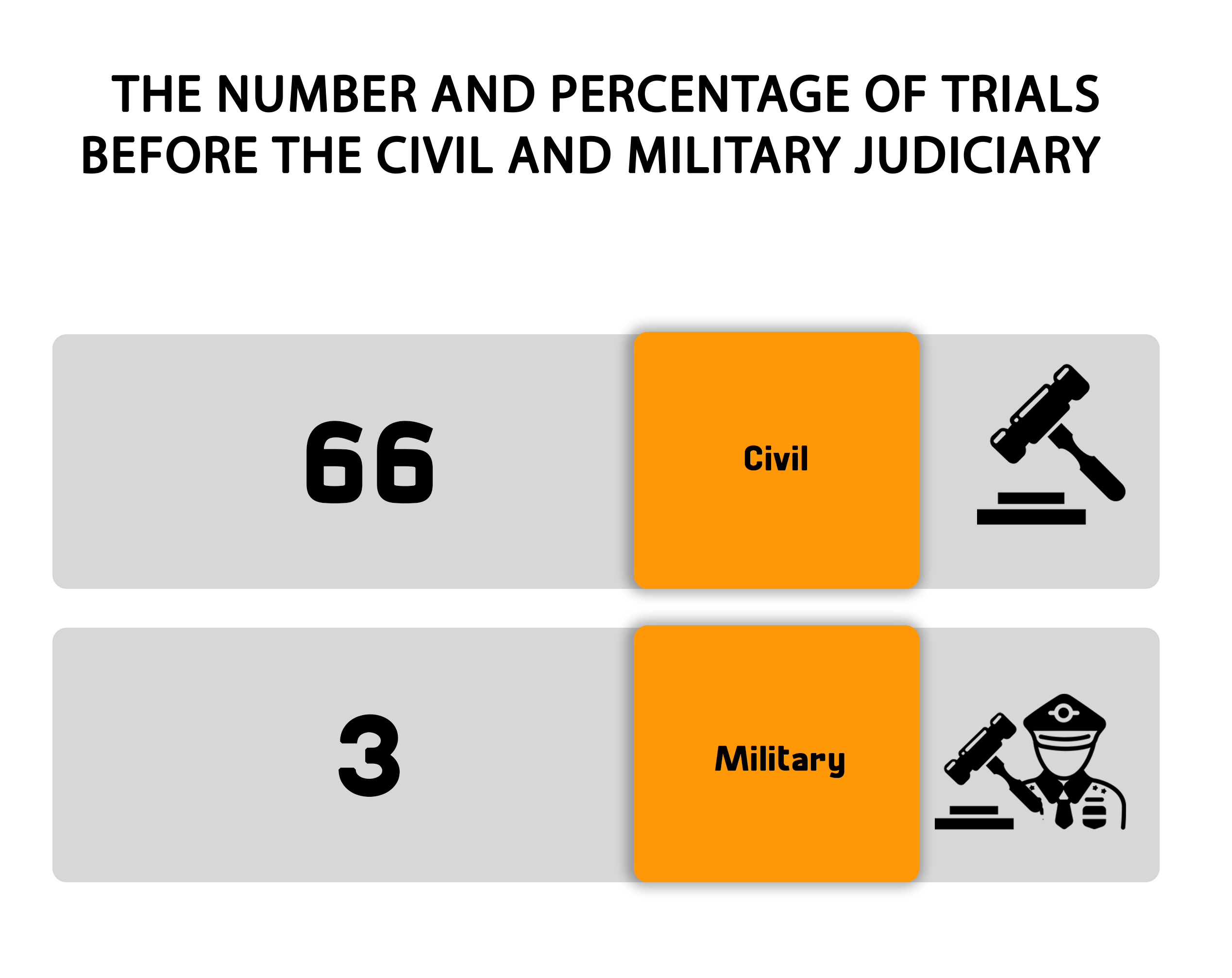
1- Trials deliberated by the civilian judiciary:
The year 2021 witnessed a continued rise in the number of trials against various political powers; due to the slow judicial process and the lack of rapid adjudication over trials on the one hand, and the introduction of new cases on the other hand. The civilian judiciary is considering 66 trials related to public affairs against different political powers.
The following table shows the number of ongoing trials against the different political powers
|
MB and NASL |
Civil democratic powers |
Mubarak regime |
Post-June 30 regime |
Total in 2021 |
|
49 |
10 |
6 |
1 |
66 |
The Muslim Brotherhood (MB) group remained on top of all the powers facing trial, followed by the civil and democratic powers, and then came in third place Mubarak’s regime figures whose trials have yet to be adjudicated over since years, as part of the cases that had been lodged against Mubarak’s regime affiliates in the wake of January 25, 2011 Revolution.
The following graph shows the percentage of ongoing trials according to the different powers
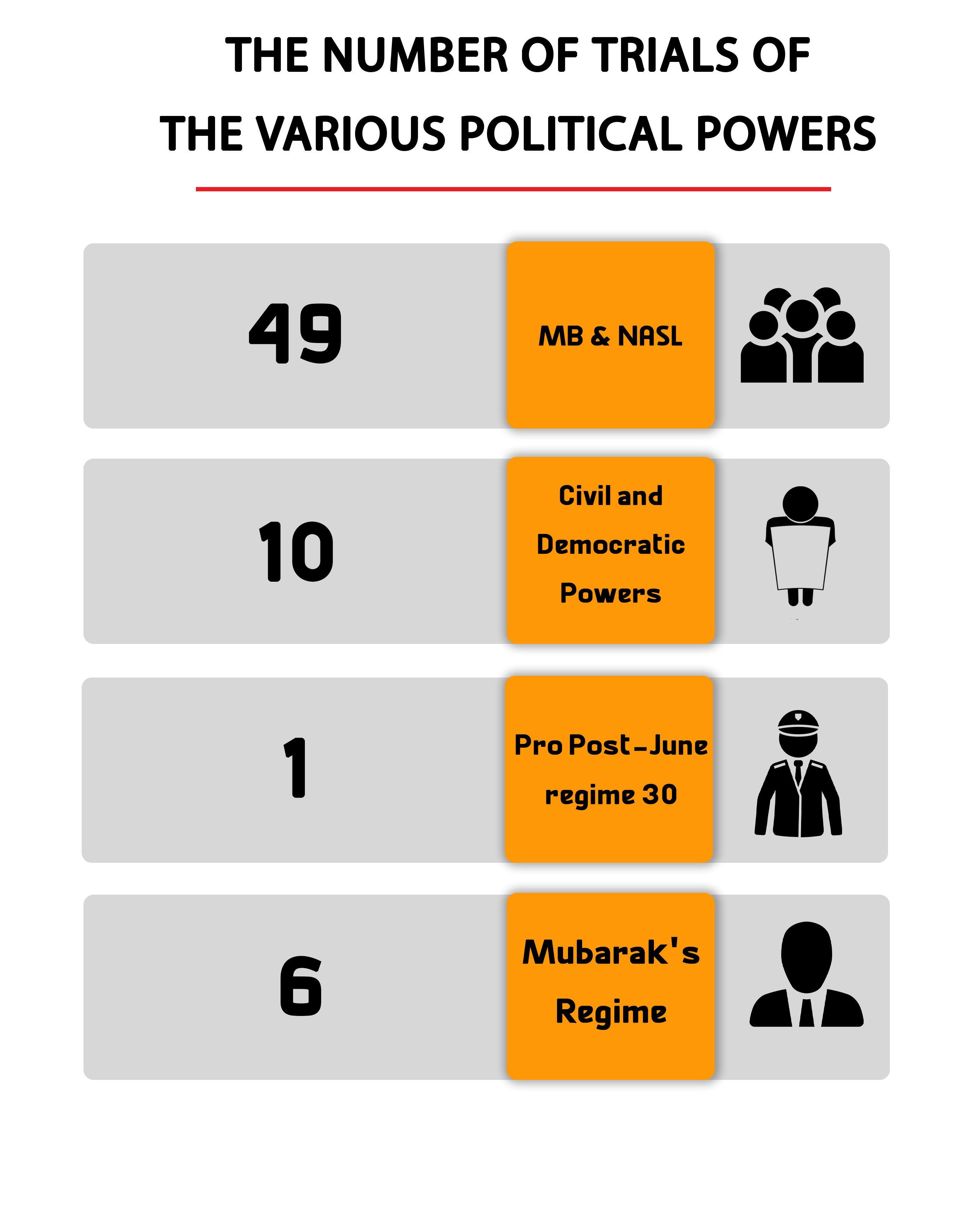
2- Military trials for civilians:
The year 2021 saw the deliberation of military trials against civilians and citizens who were brought before the special (exceptional) military tribunals.
During the year, three ongoing trials were being considered before the military judiciary, compared to 5 trials in 2020, 24 trials in 2018, 38 trials in 2017 and 32 trials in 2016.
In 2021, 432 civilians appeared before the military judiciary, while in 2020, the number of civilians brought to military trials was 1832, compared to 1562 in 2018, 1869 in 2017 and 3037 in 2016.
The following graph shows the number of military trials and the civilians brought before them during 2020
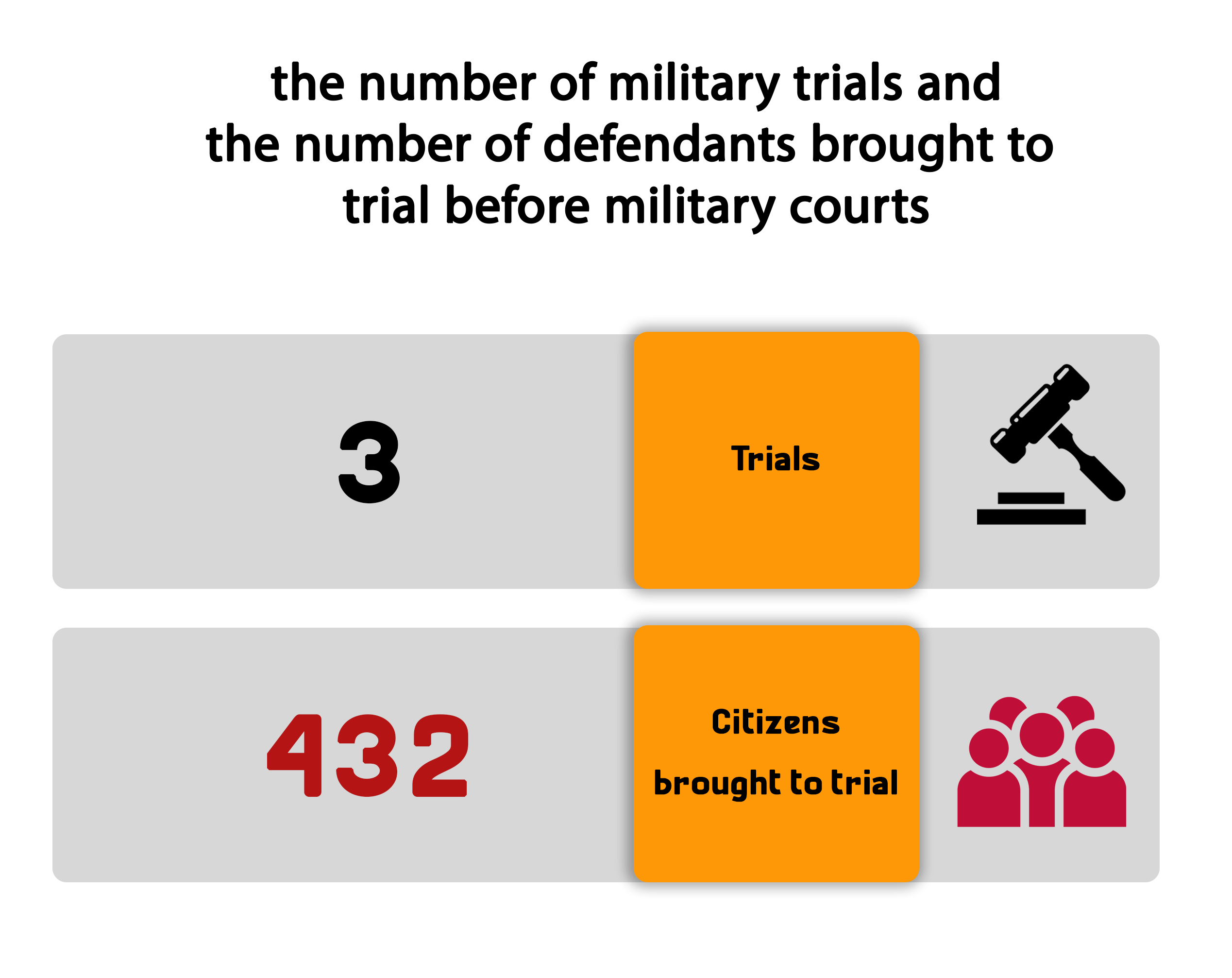
Second: Judicial Rulings
143 sentences were handed down by the Egyptian judiciary in 2021 over cases related to public affairs; of these, there were 98 rulings of conviction, 43 acquittals, and two suspended sentences issued by the criminal courts.
1- Convictions:
During the year, 98 convictions were issued against the different political powers; 4 rulings were handed down by the military judiciary against civilians, and the MB and NASL groups were at the forefront of forces that received convictions.
The following table shows the distribution of convictions among the different political powers:
-
MB and NASL
Civil democratic powers
Mubarak’s regime
Post-June 30
Military trials for civilians
Total in 2020
84
8
1
1
4
98
The following graph shows the percentage of convictions in the different trials:
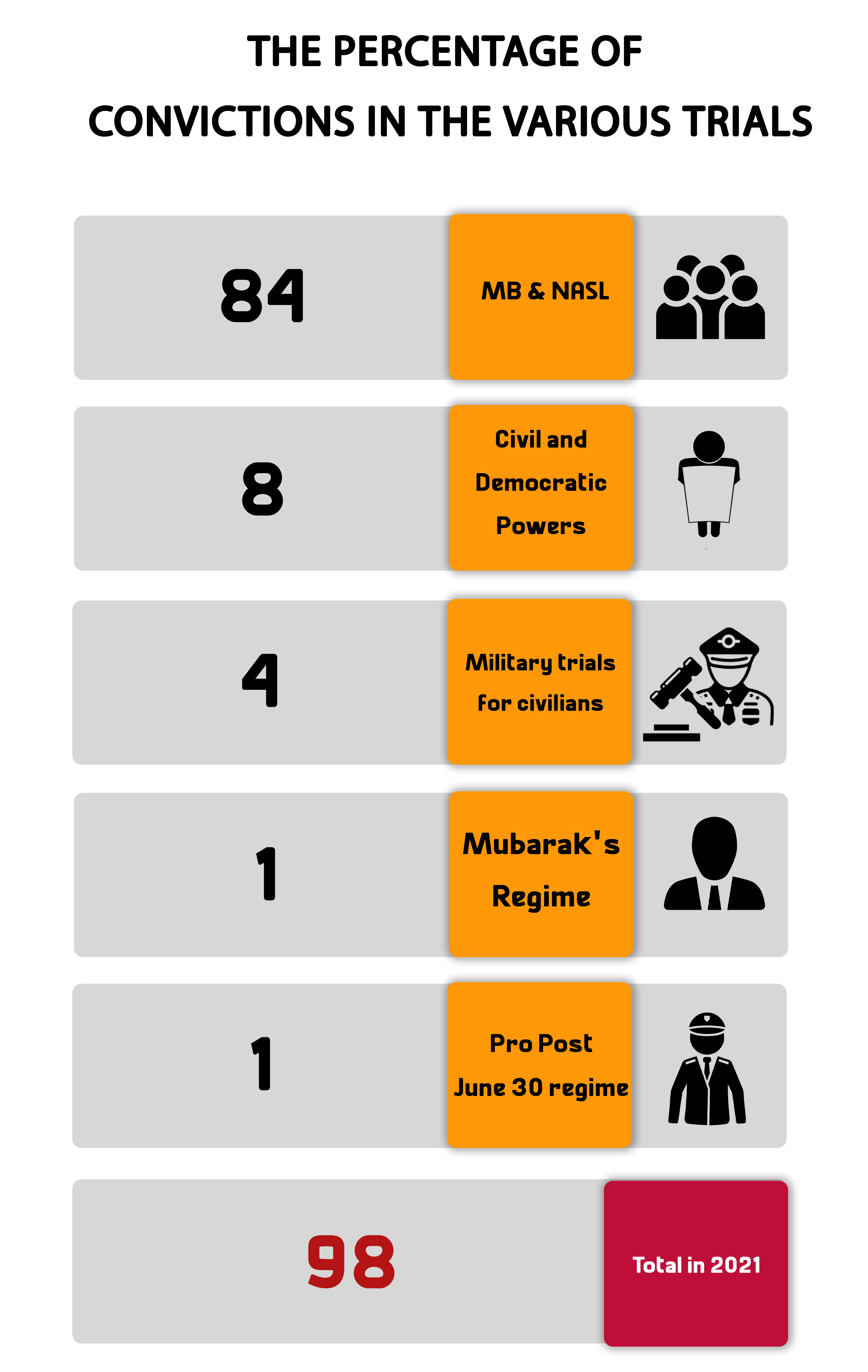
2- Acquittals
During 2021, 43 different rulings of acquittal in public affairs-related trials have been issued; of these, only one ruling was handed in military trials for civilians and 42 in trials before civil courts.
The following table shows the distribution of acquittals in numbers
|
MB and NASL |
Civil democratic powers |
Mubarak’s regime |
Post-June 30 |
Military trials for civilians |
Total in 2020 |
|
33 |
3 |
6 |
– |
1 |
43 |
The following graph shows in percentage the distribution of acquittals:
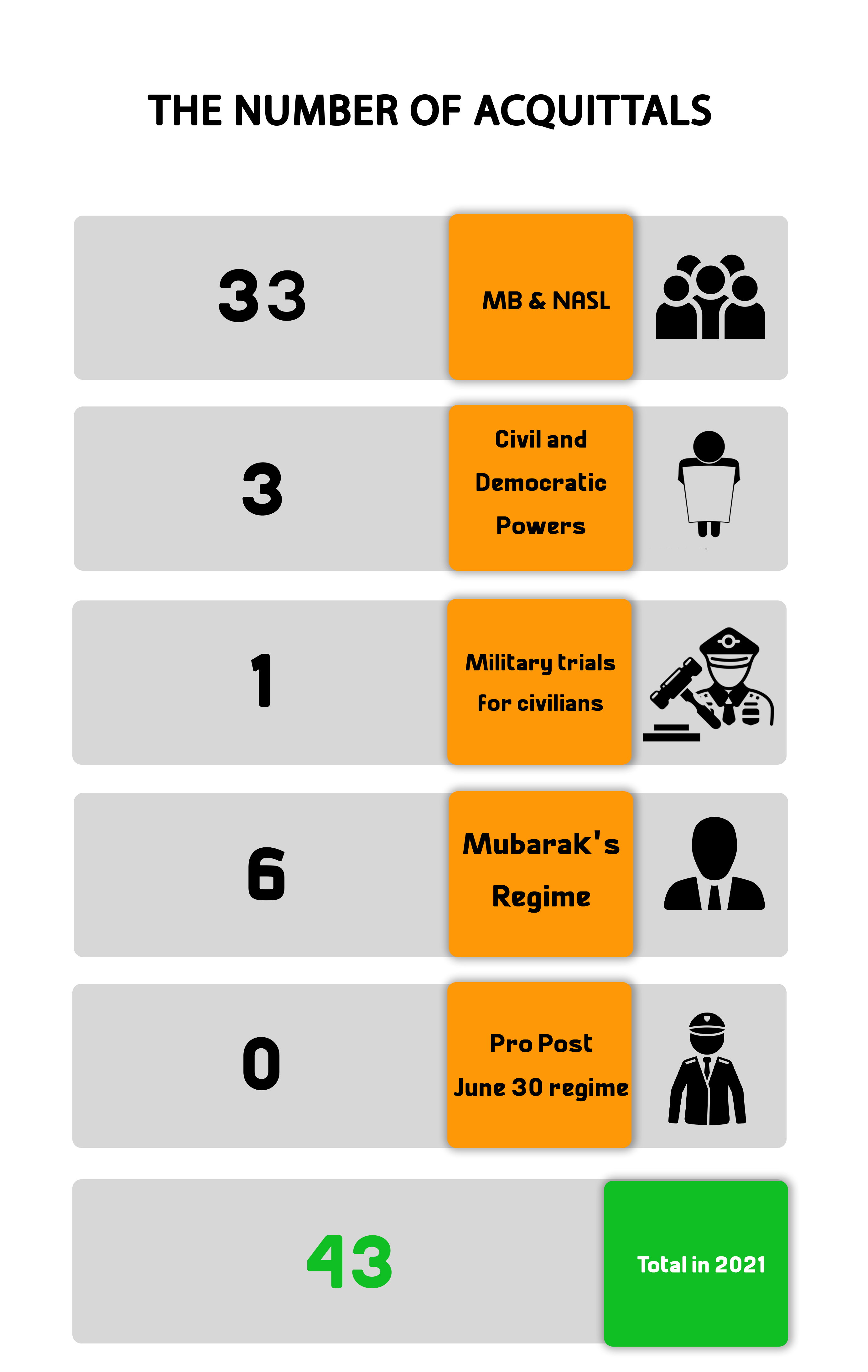
3- Sentences issued with the suspension of execution of the penalty
During 2021, criminal courts issued two rulings of conviction and ruled to suspend the implementation of the penalty in favor of members of the Muslim Brotherhood and the Alliance for the Support of Legitimacy.
4- Death sentences
During the year, 121 death sentences were handed down against 103 citizens, 42 of whom are convicted over final rulings, and 103 judgments in criminal cases against 193 defendants, including 4 with final and binding judgments.
The following table shows the number of death sentences issued by both civil and military courts
|
Death sentences issued by civil courts |
Death sentences issued by military courts |
Total death sentences |
|
121 |
— |
121 |
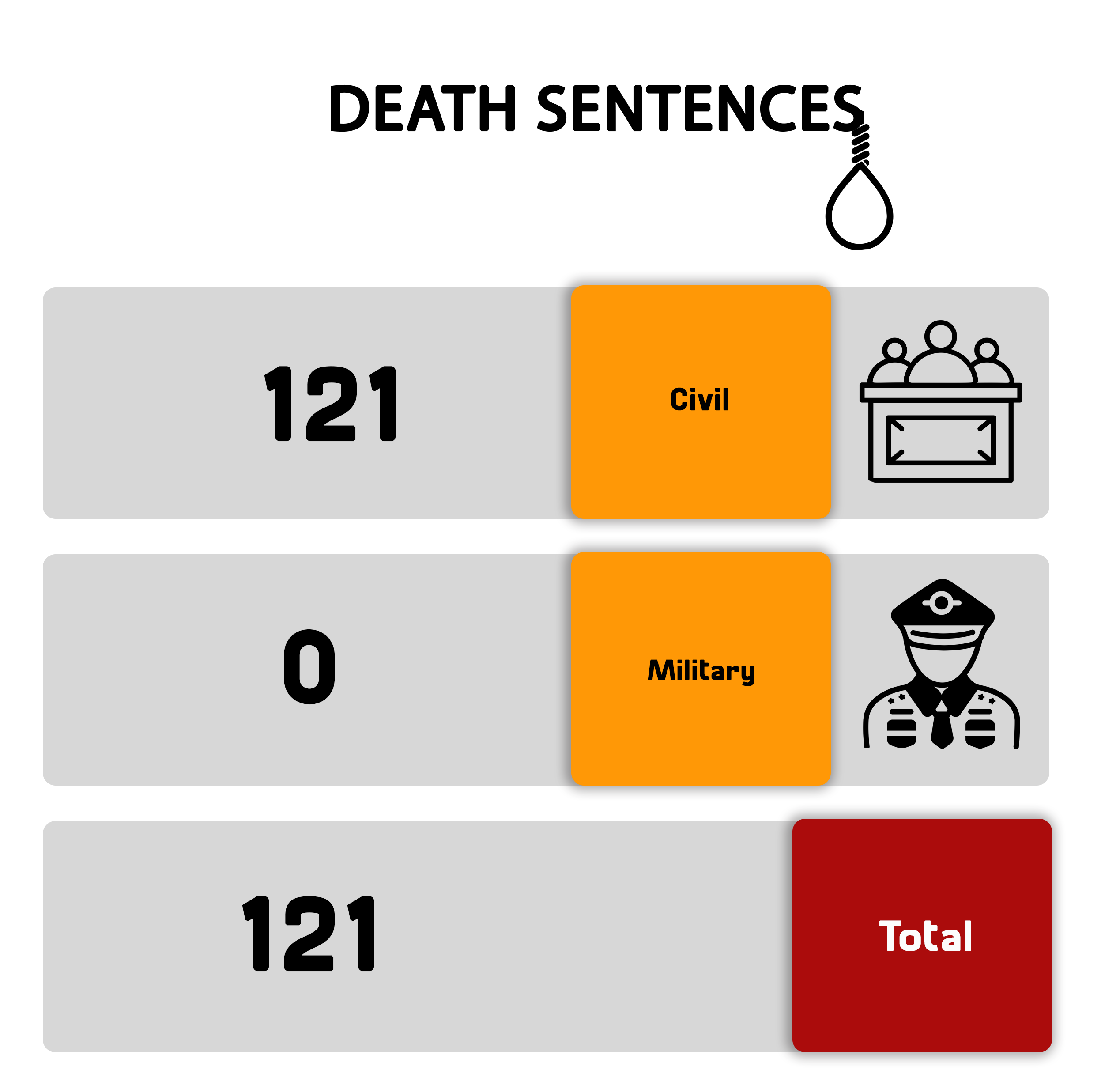
The following table shows the number of defendants who were handed down death sentences in 2021
-
Number of defendants referred to the Mufti
Number of death sentences confirmed to be executed by the Mufti
Number of defendants whose death sentences confirmed by the Court of Cassation
Total number of defendants
Civilian
92
162
46
300
Military
—
—
—
—
Total
92
162
46
300
Death sentences executed in 2021:
Egypt’s Prisons Authority sector carried out, in 2021, the death sentences handed down against 44 citizens into 17 cases. Details are as follows:
-
On 16 February 2021, the Prisons Authority sector carried out the death sentence issued against one defendant convicted of killing a student at Al-Hussainiya region in the Sharqyia Governorate.
-
On 27 February 2021, the Prisons Authority sector executed the death sentence issued against one defendant convicted of killing the daughter of her sister-in-law due to family disputes.
-
On 27 February 2021, the Prisons Authority sector executed the death sentence issued against a married couple accused of killing the owner of the apartment building where they reside, dismembering his body, placing it in bags and disposing of it.
-
On 27 February 2021, the Prisons Authority sector executed the death sentence issued against a woman and her paramour who got rid of (killed) her husband by poisoning him.
-
On 1 March 2021, the Prisons Authority sector in Damanhour Prison carried out the death sentence issued against one defendant into a criminal case in which he is convicted of committing the Kafr al-Dawar massacre in which 7 members of one family were killed after being stabbed
-
On 3 March 2021, the Prisons Authority Sector in Borg Al Arab Prison carried out the death sentence issued against a furniture carpenter convicted, in a criminal case, of murdering a woman after robbing and sexually raping her.
-
On 3 March 2021, the Prisons Authority Sector in Borg Al Arab Prison carried out the death sentence issued against 4 defendants (members of one family) accused over a criminal case.
-
On 3 March 2021, the Prisons Authority Sector in Borg Al Arab Prison carried out the death sentence issued against one defendant accused, in a criminal case, of killing his wife and children.
-
On 3 March 2021, the Prisons Authority Sector in Borg Al Arab Prison carried out the death sentence issued against one person accused of killing his mother, smashing her head and burning her body into a criminal case.
-
On 3 March 2021, the Prisons Authority Sector in Borg Al Arab Prison carried out the death sentence issued against one person accused of killing the brother of his ex-wife with a firearm and wounding others over a criminal case.
-
On 26 April 2021, the Prisons Authority sector carried out the death sentence issued against 9 defendants in the political case known in the media as “The raid on Kerdasa Police Station”.
-
On 9 May 2021, the Prisons Authority sector executed the death sentence issued against monk Wael Saad Tawadros who is accused, over a criminal case, of killing Bishop Epiphanius of Deir Abu Makar in Wadi al-Natrun
-
On 21 June 2021, the Prisons Authority sector at Alexandria’s Borg Al-Arab Prison executed the death sentence issued against 7 defendants in criminal cases.
-
On 21 June 2021, the Prisons Authority sector at Cairo Appeal Prison executed the death sentence issued against Ahmed Saeed Al-Sunbati who is accused of killing Reverend Semaan Shehata, in connection with the criminal case known in the media as the “Murder of the Marg Priest”.
-
On 27 June 2021, the Prisons Authority sector at Cairo Appeal Prison carried out the death sentence issued against 9 defendants including a woman accused over criminal cases.
-
On 4 July 2021, sources affiliated with the Ministry of Interior announced that the Egyptian Prison Authority sector in the Cairo Appeal Prison carried out the death sentence issued against one defendant, named Moataz Mustafa, affiliated with the Muslim Brotherhood, in connection with the political case known in the media as the “attempted assassination of the Alexandria Security Director”.
-
On 18 July 2021, the security forces executed the prison sentence issued against one defendant accused in a criminal case of killing his wife five years ago in Kafr Shehata village, affiliated to the Kafr Saad Center in Damietta governorate.
^^^^^^^^^^^^^^^^^^^^^
Chapter 3
Attacks against Freedom of Expression and Media Freedoms
Restrictions on media freedoms:
The year 2021 has witnessed a continuation of the massive crackdown and ongoing targeting of media freedoms. Lawyers for Democracy have monitored 131 various violations of freedom of the press and media freedoms, compared to 154 violations in 2020.
The following table shows the number of violations against freedom of expression and media freedoms throughout the year
-
Months
Number of violations
January
14
February
10
March
9
April
9
May
7
June
10
July
13
August
10
September
12
October
14
November
16
December
7
Total violations in 2020
131
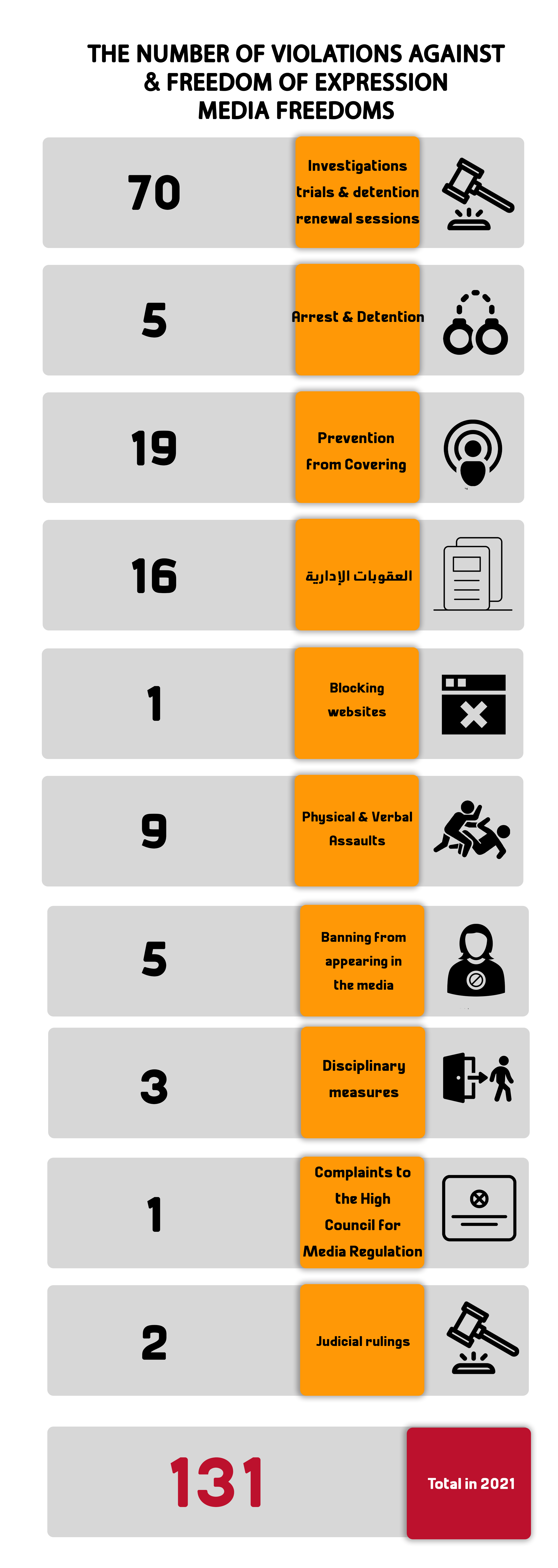 The following table shows in numbers the details of violations committed against freedom of expression and media freedoms:
The following table shows in numbers the details of violations committed against freedom of expression and media freedoms:
|
Investigation, trial and detention renewal sessions |
70 |
|
Media coverage ban |
19 |
|
Administrative sanctions (fines) |
16 |
|
Verbal and physical assault |
9 |
|
Ban from appearing in the media |
5 |
|
Arrest and detention |
5 |
|
Disciplinary measures |
3 |
|
Judicial rulings |
2 |
|
Complaint to the Supreme Council for Media Regulation |
1 |
|
Blocking news websites |
1 |
|
Total in 2021 |
131 |
^^^^^^^^^^^^^^^^^^^^^
Chapter 4
The attack on Human Rights Defenders
The year 2021 has seen a continued escalation in the systematic targeting of human rights defenders who have been subjected to constant harassment and violations, which range from arrest and detention to ongoing trials and the use of pretrial detention as a punishment. It also witnessed the rotating/recycling of a number of human rights defenders pending new cases while in remand detention.
And at time human rights defenders are subjected to continuous targeting, three of them received international awards.
First: Violations against human rights defenders:
Pretrial detention, investigations, and travel bans are no longer considered the most serious violations committed against HRDs throughout 2021; rather, the onslaught have escalated and intensified that a number of activists and defenders have been recycled and rotated into new cases whose proceedings started during their detention, entering a vicious and closed circle of pretrial detention orders. Smear campaigns against HRDs haven’t stopped as well.
The following table shows the number of attacks on human rights defenders in 2021
|
Type of violation |
Number of violations |
|
Trial sessions and pretrial detention orders |
20 |
|
Court decisions/ rulings |
5 |
|
Summoning for investigation |
5 |
|
Precautionary measures (security probation) |
2 |
|
Placing on Terrorist Entities List |
2 |
|
Rotating/ recycling (adding) HRDs into new cases while in detention |
1 |
|
Arbitrary arrest and detention |
1 |
|
Total |
36 |
The following graph shows the distribution of the violations against HRDs in percentage:
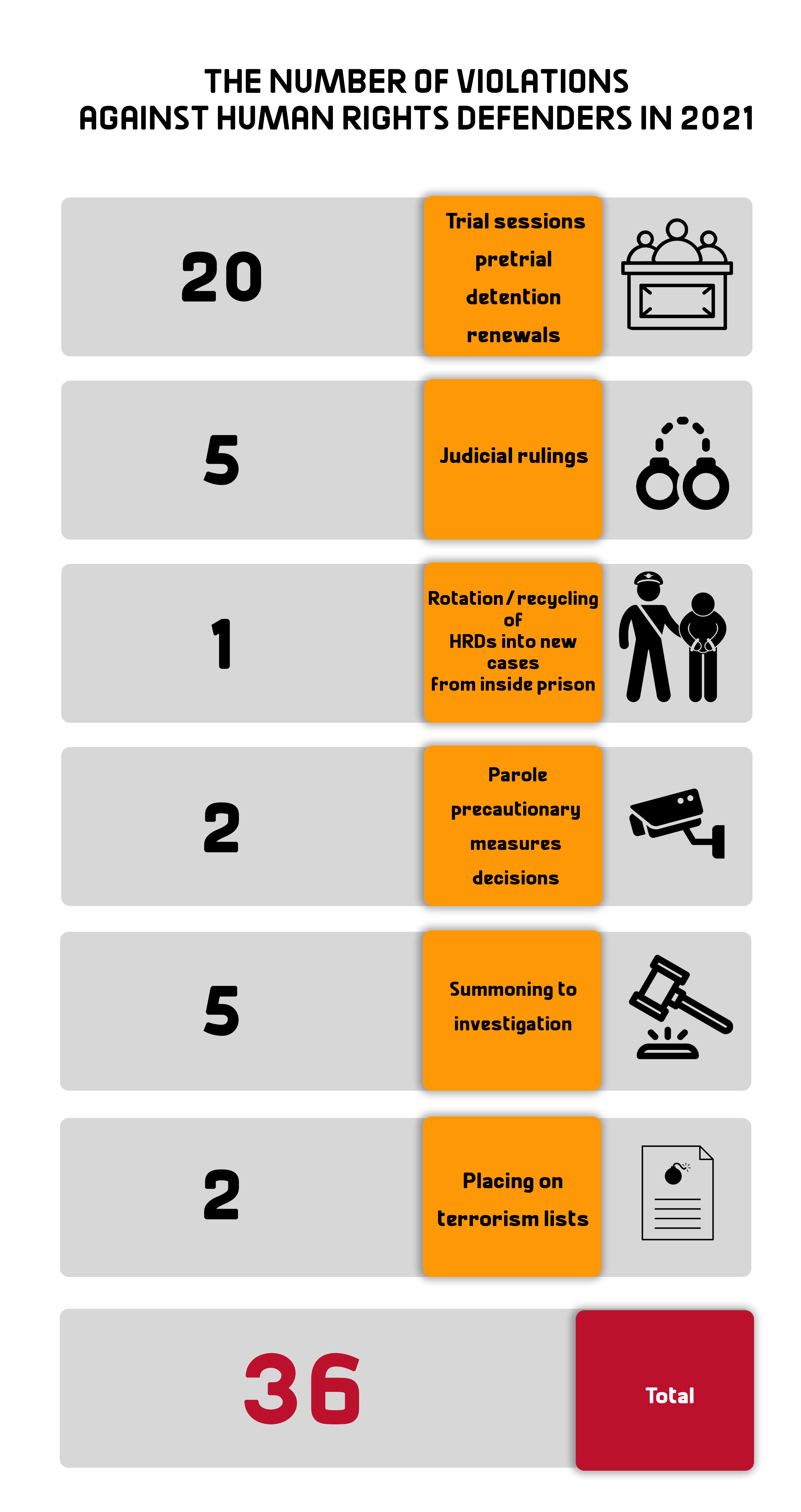
Second: Awards received by human rights defenders:
– Human rights lawyer Azza Soliman receives the Franco-German Prize for Human Rights
On 22 March 2021, German Ambassador Dr. Cyril Jean Non and his French counterpart Stephane Romatet, in a joint ceremony, handed out the 2020 joint Franco-German Prize for Human Rights and the Rule of Law to Egyptian lawyer Azza Soliman, in recognition of her outstanding efforts in the field of women’s rights in Egypt.
– Activist and journalist Esraa Abdel-Fattah wins the Democracy Courage Tribute Award
On 4 July 2021, activist and journalist Esraa Abdel-Fattah received the Democracy Courage Tribute Award for her efforts in defending media and democratic rights and freedoms in Egypt.
– Gamal Eid, ANHRI’s executive director, nominated for the Dutch Tulip Prize for Human Rights
On 4 October2021, the Dutch Foreign Ministry announced the short list of candidates for the Dutch Tulip Prize for Human Rights 2021, and human rights lawyer Gamal Eid, the executive director of the Arabic Network for Human Rights Information (ANHRI) has topped the list.
– Activist and journalist Esraa Abdel-Fattah receives the honorary citizenship of Paris
On 10 December 2021, the Mayor of Paris honored activist and journalist Esraa Abdel-Fattah and granted her the honorary citizenship of Paris at a ceremony held in Paris.
^^^^^^^^^^^^^^^^^^^^^
Chapter 5
Milestones in the Democratic Path
Influential milestones in the democratic path
The year of 2021 has witnessed a number of crucial events that have influenced the democratic process and the paths of the rule of law, which can be summarized in the following lines:
– Extending/ending the state of emergency:
On 20 January 2021, President Abdel Fattah El-Sisi announced Republican Decree No. 19 of 2021 to extend the state of emergency declared by Resolution No. 596 of 2020 nationwide for a period of three months starting from the morning of 24 January 2021. On 25 April 2021, the President issued Resolution No. 174 of 2021 by declaring a state of emergency for a period of three months starting from April 25, 2021. Then, on 12 July 2021, the House of Representatives approved in its plenary session the Presidential Decision No. 290 of 2021, regarding extending the state of emergency declared by Presidential Decree No. 174 of 2021 for further three months as of the morning on July 24, 2021. And finally, on 25 October 2021, the President announced the termination of Egypt’s nationwide state of emergency.
– Amending the Egyptian Penal Code
On 13 June 2021, the Parliament decided to amend Law No. 71 of 2021 by adding a new article to Article 186 bis of the Penal Code, stipulating that: ” Without prejudice to any more severe penalty, a fine of no less than one hundred thousand pounds and not more than three hundred thousand pounds shall be imposed on whoever photographs, films or records words or clips, publishes or broadcasts a specialized court session set to consider a criminal case without the permission of the head of the competent court after consulting the Public Prosecution, and in this case, the device and any other means used in the crime shall be confiscated, or have their content omitted, and the fine is doubled in case of recurrence.”
– Amending the law establishing the Supreme Constitutional Court:
On 14 June 2021, the Parliament’s Legislative Committee has finally approved a bill amending two articles in the Supreme Constitutional Court Law. The first of which involves the right of the court to supervise the constitutionality of the decisions issued by international organizations and adjudicative bodies against the state, and the second article guarantees that the Prime Minister may request from the President of the Constitutional Court to disregard the aforementioned decisions and provisions as well as or the obligations resulting from their implementation.
– The Parliament’s approval of the law on the dismissal of state employees upon non-disciplinary method:
In August 2021, the House of Representatives approved a draft law submitted by MP Ali Badr and 10 parliamentarians amending some provisions of Law No. 10 of 1973 regarding the dismissal of state employees upon non-disciplinary method. The bill aims to dismiss employees from the state’s administrative apparatus for mere suspicion of their affiliation with terrorist groups or for undermining the country’s national security, without imposing an administrative penalty. The Parliament has previously approved the draft law in its entirety and referred it to the State Council.
– Launching the National Human Rights Strategy:
In September 2021, the Permanent Higher Committee for Human Rights – formed by a decision of the Prime Minister in 2018 – launched the National Human Rights Strategy for the Arab Republic of Egypt 2021-2026.
– The Parliament’s approval of the amendments to the Penal Code:
In September 2021, the House of Representatives announced in its plenary session the amendment of the Article 80 (a) of the Penal Code, which stipulates that “those convicted of the crime of disclosure of state secrets will face a prison sentence ranging from six months to five years and a fine ranging from EGP 5,000 to EGP 50,000. This may apply to anyone who get, by any illegal means, one of the country’s defense secrets even if he didn’t intend to hand it over or divulge it to a foreign country or to anyone who works for it, as well as anyone who discloses, or leaks, by any means, one of the country’s defense secrets, and anyone who organized or used any means of correspondence with the intention of obtaining a state defense secret, delivering or broadcasting it.
– Amending some provisions of the Terrorism Law
In November 2021, Egypt’s President ratified the amendments of Articles 36 and 53 of the Anti-Terrorism Law which prohibit to record, film, broadcast or airs trial sessions in terrorist crimes except with the permission of the president of the competent court. The amendments also stipulate that the President of the Republic may issue a decision to take appropriate measures to maintain security and public order whenever a danger of terrorist crimes arises, or in case of environmental disasters.
– The Parliament’s approval to the law on confronting pandemics and epidemics
In November 2021, the House of Representatives, during its plenary session, approved a draft law on confronting pandemics and epidemics, which stipulates penalties of imprisonment and a fine for anyone who violates any of its measures and provisions of this law or the decisions implementing it.
– Establishing central prisons in the Wadi El-Natrun Prison Complex:
In December 2021, the Al-Waqa’i’a al-Masriya newspaper, the Egyptian Official Gazette, published in its issue No. 273 (continued), released on 5 December 2021, the decision of the Ministry of Interior No. 2277 of 2021, regarding the establishment of 6 public prisons in Wadi El-Natrun.







